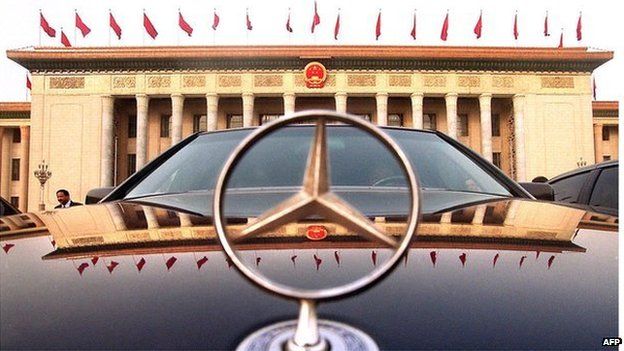China media welcomes foreign anti-corruption co-operation
- Published

Media have welcomed a joint effort by China and Australia to hunt down corrupt officials.
According to reports, police in both countries are now co-operating to track down and seize possessions of Chinese citizens who live in Australia and are suspected of fraud.
The Beijing News reports that the US, Canada and Australia are favoured by corrupt former Chinese officials who have fled to these countries and transferred assets worth billions of dollars.
Gao Bo, an anti-corruption expert at the Chinese Academy of Social Sciences, tells the Chinese edition of the Global Times that the China-Australia co-operation is proof that Beijing's anti-corruption effort has "gained international recognition".
He adds that it will set an example for other Western countries to follow.
"This will also serve as a warning to other officials who are already on the run or planning to do so, that no matter where they go, they will still face the judgement of China's court, so it is a very strong deterrent," explains the pundit.
An unnamed official tells the China Daily that Beijing "faces difficulties over the return of fugitives due to a lack of bilateral extradition treaties and political and legal problems with the United States, Canada and Australia".
Commenting on the obstacles, Dai Peng, director of the Criminal Investigation Department at People's Public Security University of China, urges Western states to drop their "prejudice toward China's political and judicial system".
"They should enhance bilateral judicial co-operation on intelligence sharing and conducting joint operations," he says, suggesting that other nations should "take effective measures to help Chinese police capture and win the extradition of economic fugitives and recover their illegal assets".
Noting that Australia has been termed a "paradise for Chinese corrupt officials", the Beijing News describes the co-operation with Canberra as a "breakthrough".
Party plenum
Meanwhile, discussion on "achieving a law-based society" dominates the press after an important meeting of the ruling Chinese Communist Party, focusing on fighting corruption, started in Beijing on Monday.
The state-run People's Daily publishes a series of articles dedicated to the plenum of the ruling party's central committee. The paper hails the government's drive to strengthen the "rule of law", saying it will help China achieve greatness.
An article in the Liberation Army Daily takes the discussion further and calls for also strengthening the rule of law when it comes to military affairs.
According to the paper, several problems currently plague the Chinese armed forces. Among them it lists loose implementation of rules, lack of self-restraint and displaying dishonesty during military exercises and evaluation.
"All these are undesirable… We have to clearly understand the urgency of strengthening the rule of law when managing military affairs and adopt a law-based system to build up and manage the armed forces so that we can be victorious in war," says the commentary.
Ebola
And finally, some media outlets express confidence in the Chinese government's ability to contain the Ebola virus if an epidemic occurs in the country.
The outbreak in West Africa has become the deadliest occurrence of the disease since its discovery in 1976.
A commentary in the overseas edition of the People's Daily says that the Chinese government has impressed the world with its rescue operations and reconstruction efforts when having to deal with several disasters in the country in the past few years.
The Global Times reports that China has joined the global fight against Ebola with "generosity" by deploying more than 200 medical experts and offering 234 million yuan (£23.6m; $38.2m) worth of medical supplies and humanitarian aid to the worst-affected regions.
Noting that China's "goodwill" has been met with "suspicions" because of its economic presence in Africa, the paper says Beijing is "caught in a dilemma".
"On the one hand, it is called on to assume more responsibilities in the international community due to its rapid rise, but on the other hand, it is feared that public goods provided by China will change or even overturn the obsolete pattern of benefit distribution. Being needed and being suspected at the same time will probably be a normal state China has to face," writes the Global Times.
BBC Monitoring reports and analyses news from TV, radio, web and print media around the world. For more reports from BBC Monitoring, click here. You can follow BBC Monitoring on Twitter and Facebook.